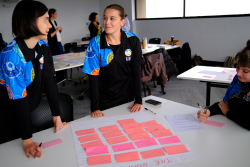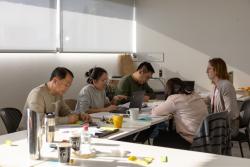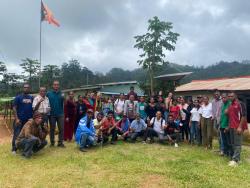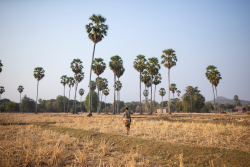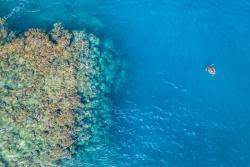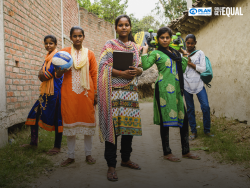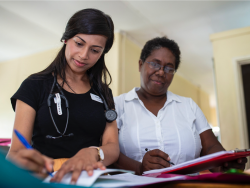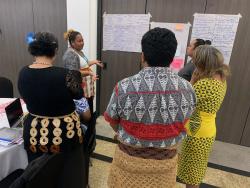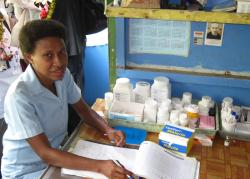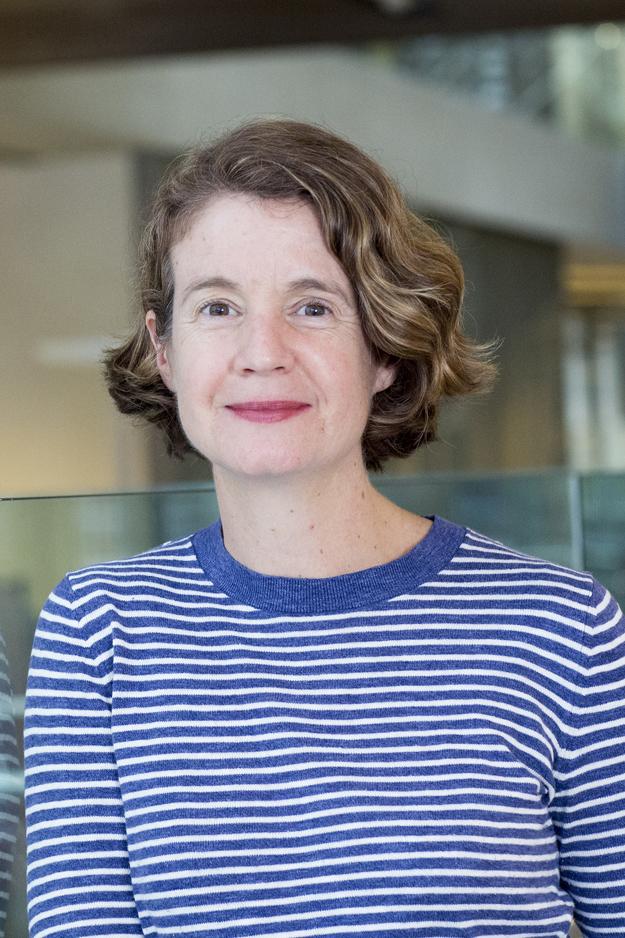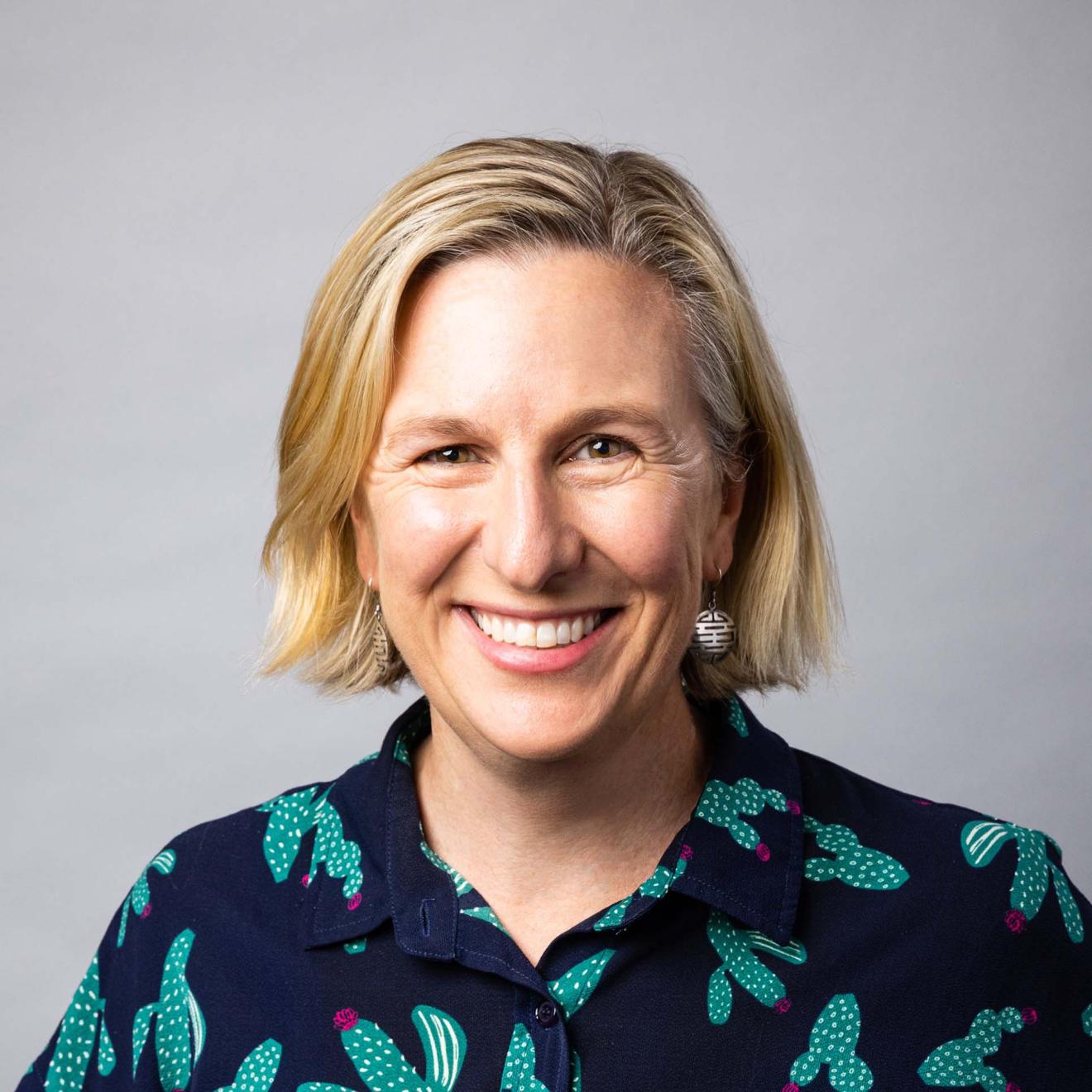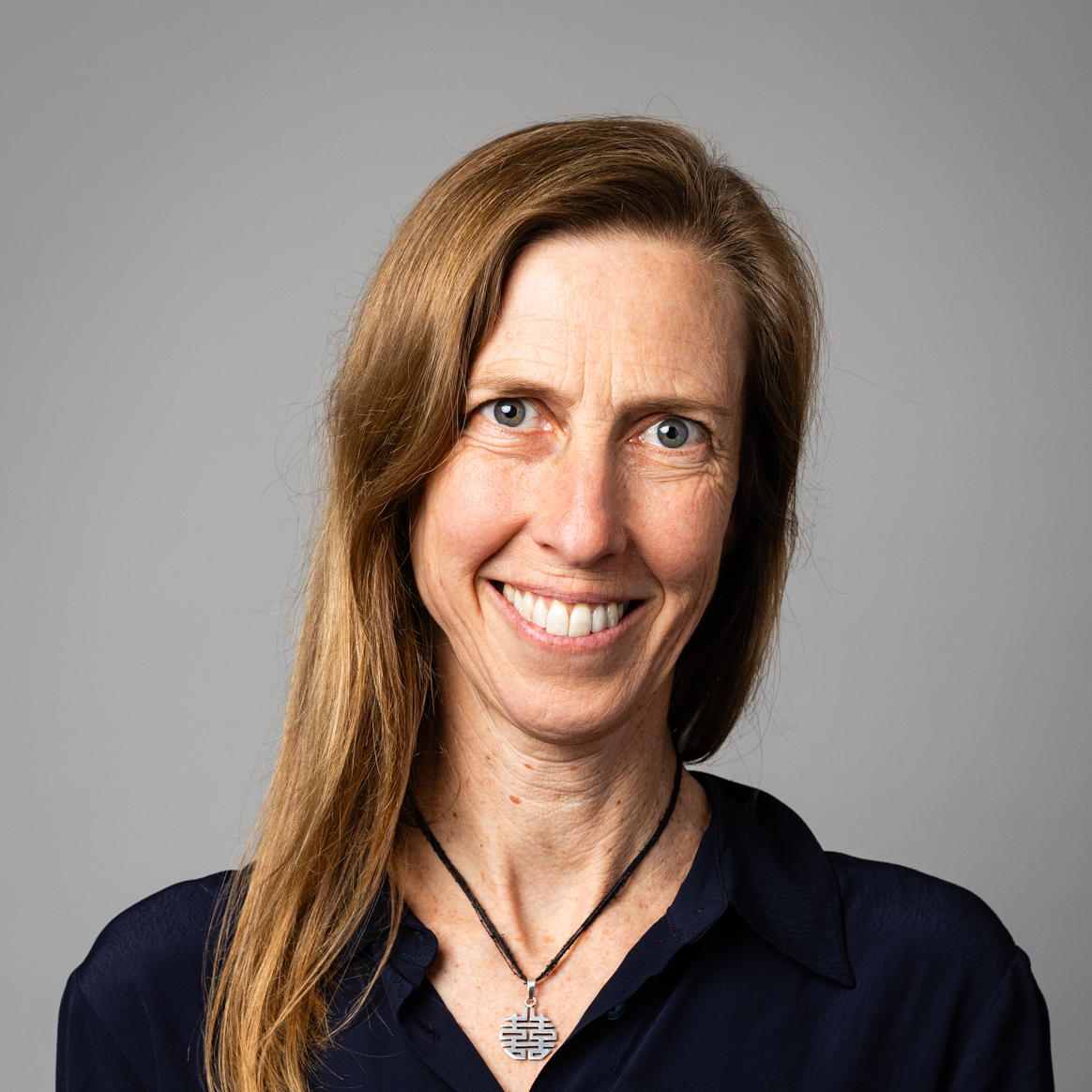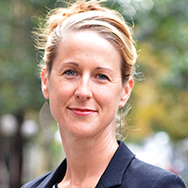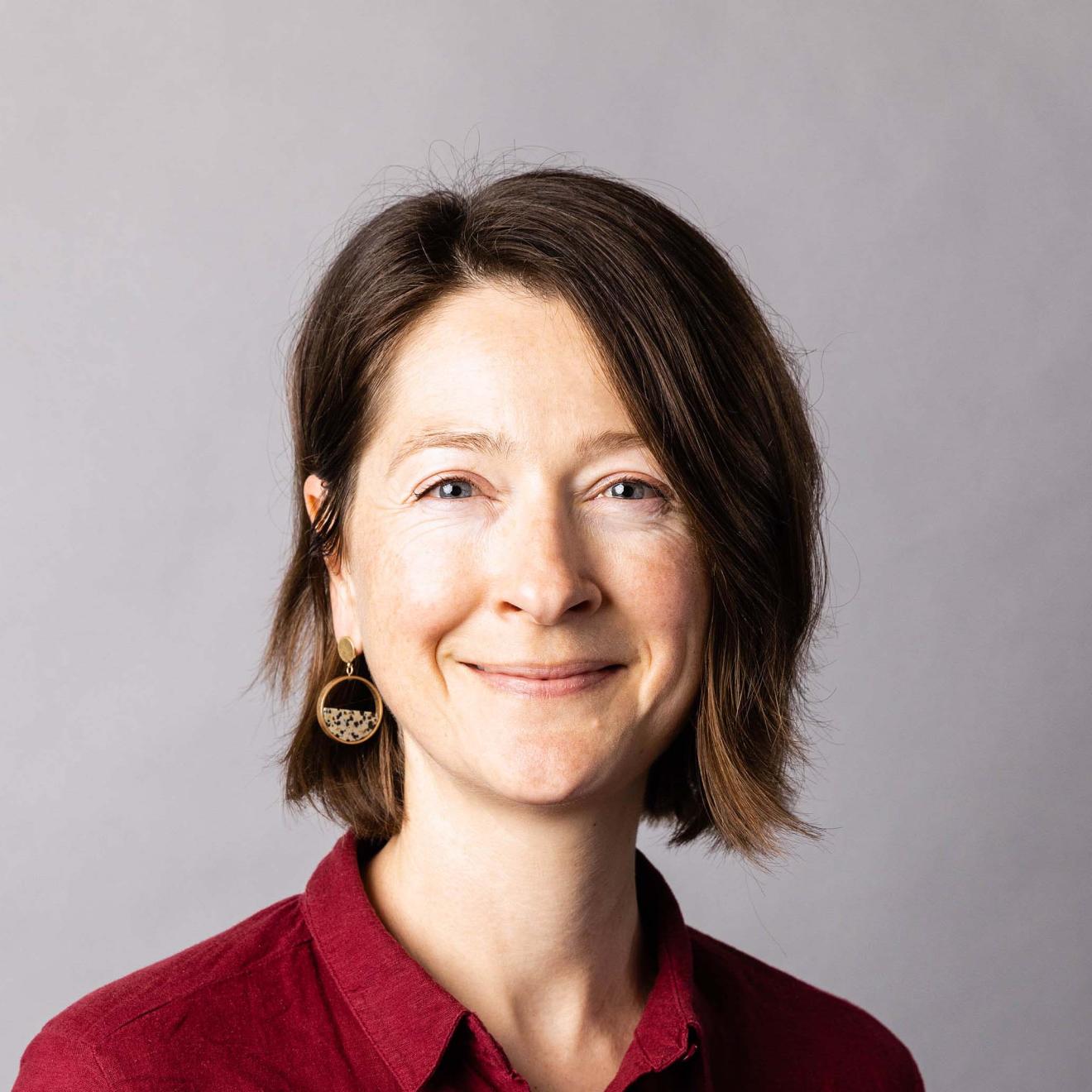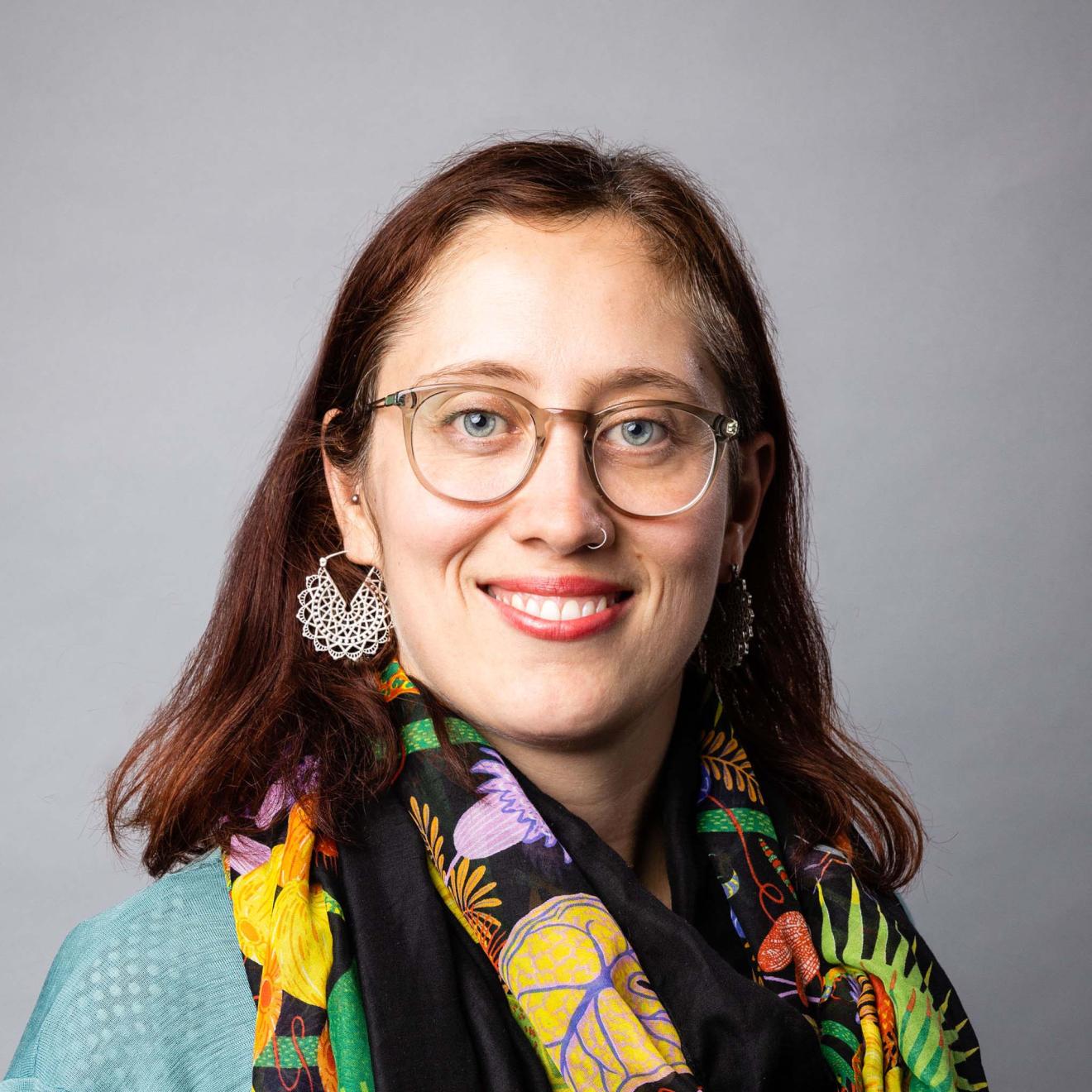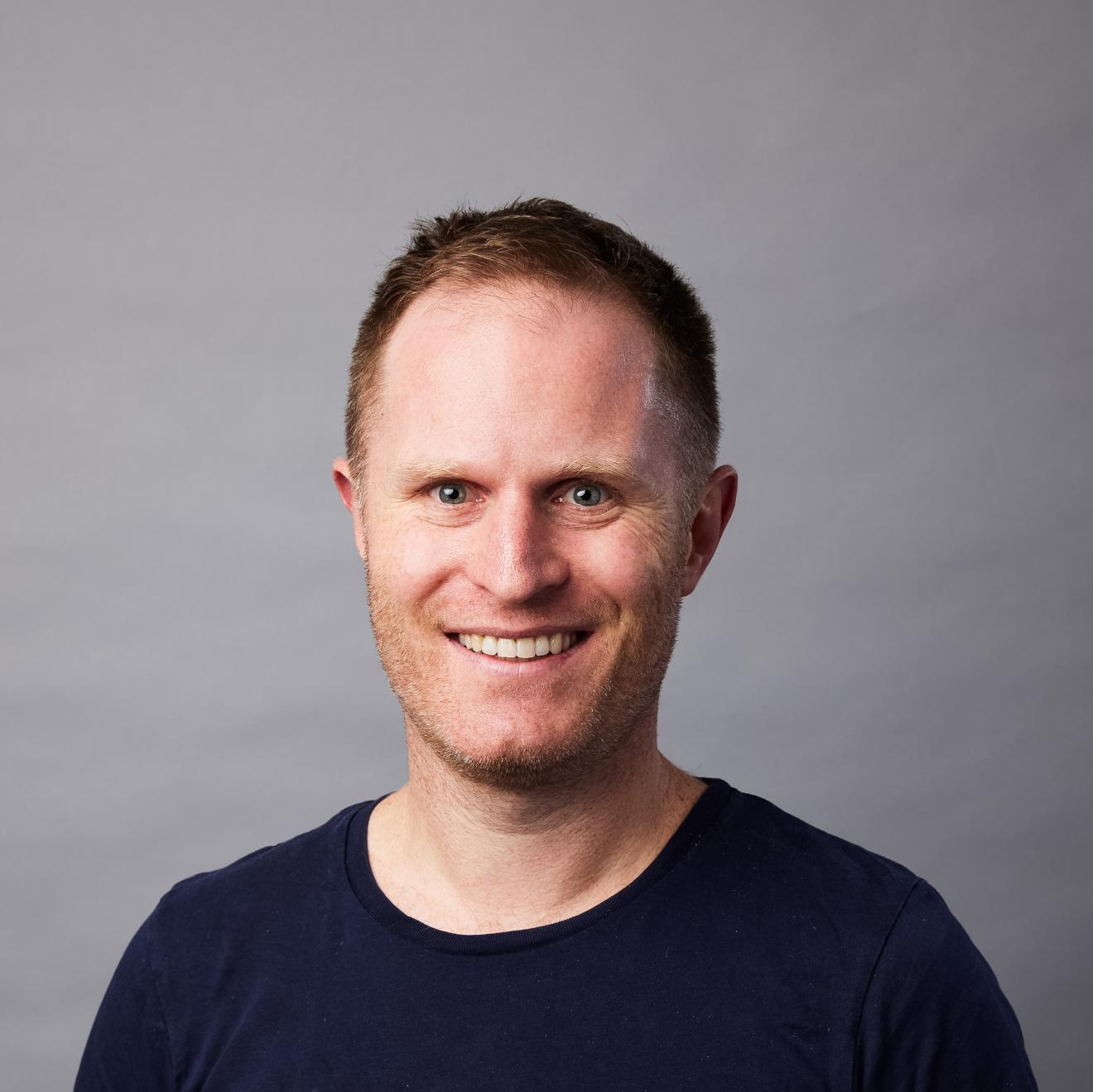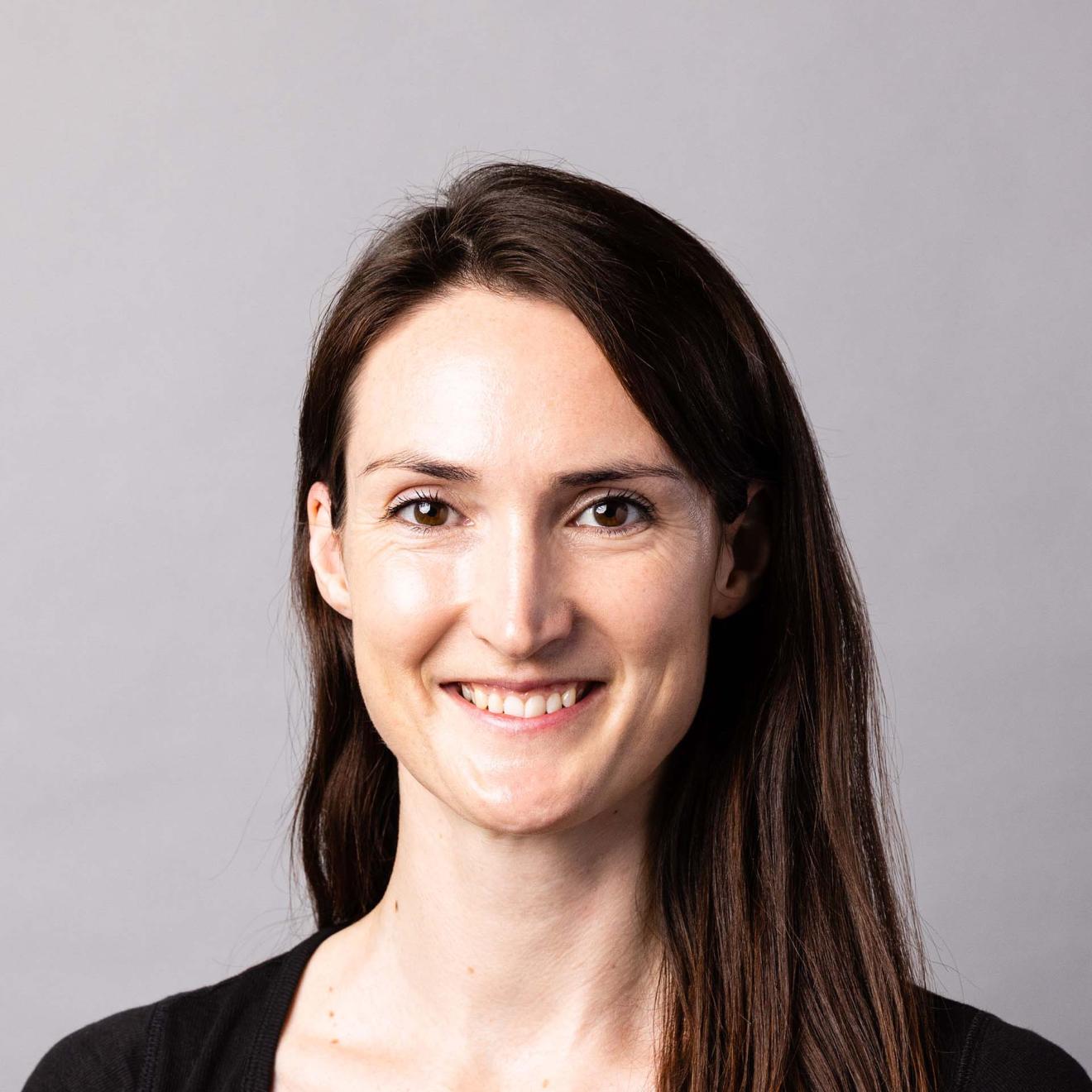Addressing the complex challenges of international development and aid effectiveness through research, innovation and partnership.
ISF is recognised for its research leadership in aid effectiveness and international development to address the global challenges of sustainable and equitable development.
For the past 20 years, we have worked in partnership with government, private sector, NGO and civil society stakeholders to create change towards sustainable futures. Our international development team has experience working in government and commercial environments at an international level.
This work spans urban and rural areas at regional and national levels and through community-based engagement.
ISF's strengths include:
- an integrated approach to achievement of the Sustainable Development Goals (SDGs), working across multiple goals
- frameworks and tools to support the process of ‘evidence to impact’
- expertise in gender equality, citizen voice and good governance
- skills in building monitoring and evaluation (M&E) capacity
- established local networks and partner researchers in multiple countries.
Our experience with a diverse range of technical, economic and policy skills allows us to develop research solutions that create change in a personalised and effective manner. We seek to creative effective and lasting programming and policy change through our work
Our specialist skills include:
- academic independence, quality, credibility and rigour combined with practitioner experience
- experience working at strategic, program and project levels and linking realities on the ground to influence policy
- strategic influence to leverage change through sound research design, a collaborative approach and effective communication
- innovation in research approach and methods, and leadership in participatory research design
- commitment to ethical principles of participation and equity
- partnership approaches to working and effective cross-cultural expertise and experience.
PROJECT | 2024
Developing Guidance Notes and providing training for KONEKSI research partners
UTS-ISF developed Guidance Notes on Partnerships, Gender Equality, Disability & Social Inclusion (GEDSI), and Impact, and facilitated webinars for 2024 KONEKSI grantees.
The DFAT-funded Knowledge Partnership Programme (KONEKSI) is Australia’s flagship initiative in Indonesia's knowledge and innovation sector. The purpose of the program is to promote knowledge-based solutions for inclusive and sustainable policies and technologies. To enhance collaboration and mutual understanding, KONEKSI identified key training needs for grantees, in the areas of Gender Equality, Disability & Social Inclusion (GEDSI), research partnership and research impact. KONESKI recognised the wealth of resources and materials already prepared by the Research Development Impact (RDI) Network on these topics and sought to package these for KONEKSI grantees. RDI Network commissioned UTS-ISF in this work.
Funder: KONEKSI
Client: ACFID/Research for Development Impact Network (RDI Network)
Researchers: Anna Gero, Tazrina Chowdhury, Keren Winterford
PROJECT | 2024
Developing monitoring, evaluation and learning with the Australian Indigenous Governance Institute
The Australian Indigenous Governance Institute is developing an approach to monitoring, evaluation and learning with support from UTS.
PROJECT | 2024
Evaluation Course for the Cambodian Ministry of Economy and Finance
Over five days in May 2024, ISF’s International Development team delivered an evaluation course tailored to 13 delegates from the Cambodian Ministry of Economy and Finance.
PROJECT | 2023-2024
Community Resilience Case Studies on Climate Change and Disasters in Fiji, Kiribati, and Timor Leste
Exploring insights from Community Resilience Case Studies on climate change and disasters in Fiji, Kiribati, and Timor Leste.
View more projects
PROJECT | 2022-2025
Organisational capacity strengthening and international volunteering
ISF researchers are working with the Australian Volunteers Program and a selection of their partners in the Asia-Pacific to undertake research on partners’ experiences of organisational capacity strengthening.
PROJECT | 2022-2023
Assessing the research to policy interface in Lao PDR
The Australian Centre for International Agricultural Research (ACIAR) has commissioned the Institute for Sustainable Futures (ISF) to undertake theory-based outcome evaluations that assess how research contributed to outcomes, including policy, in three sectors in Lao PDR: fisheries, forestry and water resources.
PROJECT | 2022-2024
Australia Pacific Climate Partnership Monitoring, Evaluation, Reporting and Learning (MERL) Services (Phase 2)
The Australia Pacific Climate Partnership supports the integration of climate and disaster resilience across Australia’s aid program in the Pacific. The organisation has developed a Phase 2 Monitoring, Evaluation, and Learning (MEL) Plan which outlines a comprehensive approach to monitoring progress, evaluating impact and reporting and learning from experience. The Climate Partnership is partnering with UTS-ISF to ensure for effective and efficient implementation of the Climate Partnership MEL plan. The researchers from UTS-ISF will lead a suit of specific activities including outcome harvesting exercises, participatory workshops, learning and reflection sessions, case studies and reports, which will generate learnings to improve program performance, contribution, and impact.
Read a case study about community resilience in Fiji here
Read a case study about community resilience in Kiribati here
Read a case study about community resilience in Timor Leste here
Read a Synthesis Report about community resilience here
Client: Palladium - Australia Pacific Climate Partnership Support Unit
Location: Pacific region
Researchers: Anna Gero, Tazrina Chowdhury, Keren Winterford, Jessie Meaney-Davis, Tamara Megaw
PROJECT | 2022
Australia – SPC Partnership Evaluation 2022: Institutional strengthening and partnership mechanisms
The Government of Australia and the Pacific Community (SPC) have jointly commissioned the Institute for Sustainable Futures at the University of Technology Sydney (ISF) and CoLAB Consulting, Fiji, to conduct a partnership evaluation.
From July to November 2022, researchers from ISF and CoLAB Consulting, Fiji are undertaking an evaluation of the contribution and impact of the current ten-year partnership between the Government of Australia (GoA) and the Pacific Community (SPC).
PROJECT | 2021
Girls’ civic engagement and activism for gender equality in Asia-Pacific: breaking down barriers and unlocking their potential
This regional research sought to understand what support young female advocates across the Asia-Pacific region need from their governments, supporters and key stakeholders to become active change agents who promote gender equality and inclusive societies.
Based on learnings from current and emerging actions, this research was intended to influence and inform the actions of government and civil society as well as inform the strategic direction of Plan International in its efforts to support and catalyse girl and youth-led movements. The research featured three stories of successful youth activism and was also aimed to support female youth advocates in their ongoing work for gender equality and social inclusion in the Asia-Pacific.
The research was carried out remotely by a research team that included ISF researchers and researchers in Fiji and Indonesia. The research output is shared by Plan International as part of its focus on girls leadership in the region and also contributes to the annual Asia-Pacific Girls report containing a comparative leadership index report prepared by Plan International.
Location: Bangladesh, Fiji, Indonesia, Philippines, Solomon Islands, Timor-Leste, Tonga, Vietnam
Client: Plan International Asia-Pacific Hub
Researchers: Tamara Megaw, Keren Winterford, Sandra Dewi Arifiani, Iris Low
PROJECT | 2018-2021
Australian Volunteers Program Impact Areas evaluations
ISF was tasked to assess effectiveness and impact of different kinds of volunteer work against the Australian Government stated goals.
PROJECT | 2016-2021
“I’m Prepared”: gender equality and empowerment for refugee women
Research partners to support gender equality outcomes of refugee women in the return and reintegration process.
PROJECT | 2018-2021
Gender Transformative Social Accountability in WASH
Explores social accountability in the context of inclusive WASH, with a focus on improving water service levels in rural Bangladesh.
PROJECT | 2019
Development in the urban era
ISF was asked to lead a steering group responsible for collaborative development with Department of Foreign Affairs and Trade (DFAT) and sector stakeholders of an approach to better integrate urbanisation into development programming in Asia and the Pacific.
Location: Australia, Asia, Pacific
Client: DFAT - Research for Development Impact Network (RDI Network)
RESEARCH OUTPUTS
Development In the urban era: six strategies for better managing urbanisation in Asia and the Pacific (2019) (Report)
PROJECT | 2019
Pacific Women Tonga evaluations
Evaluating the impact, value for money and insights of gender equality programs in Tonga.
PROJECT | 2019
RDI Network workshop: Enhancing Research Use in International Development
In 2019, ISF took part in the Research for Development Impact Network (RDI Network)'s Enhancing Research Use in International Development workshops.
Over two days, research advocates from across 12 organisations in the international development sector met to discuss the constraints associated with research and to identify ways in which more dynamic connections between research, policy and practice can be built and constraints can be shifted.
The research advocates were supported by a four-person facilitation team and worked with other participating organisations to develop a sense of mutual support, test solutions, and reflect on ‘what worked’ and what did not. The results were shared among research advocates and informed a anonymised recommendations report and guidance document for the sector. In addition, success stories from participating organisations were shared through RDI Network channels and interim communications products.
Location: Australia, Asia, Pacific
Client: ACFID/Research for Development Impact Network (RDI Network)
PROJECT | 2018-2021
From urban waste to sustainable value chains: linking sanitation and agriculture through innovative partnerships in Sri Lanka
This applied research project in Sri Lanka connects the waste management, sanitation and agriculture sectors through the circular economy, to improve food security and environmental health. This project is a partnership between ISF, the International Water Management Institute, Janathakshan Ltd, Sabaragamuwa University of Sri Lanka and the Sri Lankan Department of Agriculture.
PROJECT | 2018-2019
Act for Peace Community-Based Protection Approach
Together with Act for Peace, ISF prepared a briefing note on Act for Peace’s Community-Based Protection Approach, which aimed to build a common understanding among Act for Peace and partners about community-based protection and inform continued motivation and commitment to it.
The briefing note was informed by a document review, a series of semi-structured interviews and extensive consultation with Act for Peace technical staff. The briefing note provided rich insights into the Community-Based Protection Approach, including conceptual understandings and basic definitions, as well as practical examples of community-based protection.
Location: Sydney based
Client: Act for Peace
Partner: Act for Peace
Researchers: Keren Winterford, Tamara Megaw
PROJECT | 2018-2019
We Rise Phase 2 mid-term evaluation
In 2019, ISF conducted an independent assessment of ‘We Rise Phase 2’, a program funded by AusAID and led by the We Rise Coalition (comprising Diverse Voices and Action for Equality, Fiji, FemLINK Pacific, Fiji Women’s Rights Movement, and International Women’s Development Agency).
ISF's evaluation informed the practice of the Department of Foreign Affairs and Trade (DFAT), Pacific Women and the We Rise Coalition and contributed to broader discourse and practice relating to coalition and partnership building for advancing women’s human rights in Fiji and The Pacific.
Location: Fiji
Client: Department of Foreign Affairs and Trade (DFAT)
Partner: Pacific Women
Researchers: Keren Winterford, Caitlin Leahy
PROJECT | 2018
Demonstrating impact and outcomes across scales
The Australian Council for International Development (ACFID) and the Research for Development Impact Network (RDI Network) led novel work on 'demonstrating impact and outcomes across scales'. ISF provided leadership for this through Professor Juliet Willetts' contribution to an RDI Network steering group, and Dr Keren Winterford's facilitation of a workshop on monitoring and evaluation (M&E) trends among NGOs.
The workshop focused on stretching the sector into the future, asking, "What does the future look like when considering impact across scales? And what do we need to do to get there?" Workshop facilitators drew from research, papers and resources to sharpen participants’ expectations of the demands of M&E today and into the future.
ACFID and the RDI Network subsequently explored a range of options in advancing the dialogue on strategic approaches to improving and promoting effectiveness in development work.
Location: Sydney based
Client: ACFID/Research for Development Impact Network (RDI Network)
Researcher: Keren Winterford
RESEARCH OUTPUTS
Demonstrating outcomes and impact across different scales (2018) (Report)
ACFID and RDI Network (2018) Workshop outcomes report
PROJECT | 2018
Monitoring, evaluation and learning for agribusiness in Papua New Guinea
This monitoring, evaluation and learning (MEL) activity provided assessment of an agribusiness project focused on cocoa small-holder farming, as well as contribution to ongoing MEL of the project.
The assessment identified the appropriateness of a localised approach that imbedded ownership of change management processes within the cocoa board and the value of a private-sector business orientated approach to cocoa farming.
The MEL activity also assessed the value of indigenous-to-indigenous exchange and identified the potential and opportunity to increase Australian indigenous engagement as a means of effective capacity development.
Location: PNG
Client: i2i Development
Researcher: Keren Winterford
PROJECT | 2017
Caritas strengths-based approach research
ISF researchers analysed the impact of strength-based approaches (SBAs) in select Caritas Australia projects in Malawi and Zimbabwe. It seeks to provide insights for Caritas Australia about the practice and outcomes of SBAs to improve future programs.
Location: Malwai
Client: Caritas
Researchers: Ian Cunningham, Keren Winterford
PROJECT | 2017
Evaluation of the Fiji Community Development Program
ISF undertook an end-of-program evaluation of the Department of Foreign Affairs and Trade (DFAT)'s Fiji Community Development Program, assessing the program's impact against its two main objectives: 1) to mitigate social and economic hardship faced by poor, vulnerable and excluded communities in Fiji by funding the community development work of civil society organisations (CSOs); and to strengthen CSO capacity to deliver relevant and efficient programs in these targeted communities. The evaluation contains lessons for DFAT's future work with civil society in Fiji.
Location: Fiji
Client: DFAT
Researcher: Keren Winterford
RESEARCH OUTPUTS
Fiji Community Development Program End of Program Evaluation and management response (Mixed)
PROJECT | 2017
FemLINKpacific evaluation IWDA
ISF was asked by femLINKpacific to assess the outcomes and impacts of their programming from 2012 to 2016, as well as the implementation of the organisation's Strategic Plan January to March 2017.
Location: Fiji
Clients: FemLINK, IWDA
Researchers: Keren Winterford, Caitlin Leahy
PROJECT | 2017
Social Audit Handbook: Timor-Leste
The Social Audit Handbook was produced by ISF's by Dr Keren Winterford and Caitlin Leahy, with funding support from the European Union, The Asia Foundation and NGO Forum Timor-Leste.
The handbook enables civil society organisations to train and support community members in the process of social auditing. It includes general guidance in social auditing for any sector, program or project in Timor-Leste.
Location: Timor-Leste
Client: The Asia Foundation
Researchers: Keren Winterford, Caitlin Leahy
PROJECT | 2015–2017
Pacific Risk Resilience Programme mid-term Evaluation
The Pacific Risk Resilience Programme (PRRP) was a large-scale initiative that aimed to build national and regional risk governance, improving the resilience of Pacific communities. ISF led a mid-term evaluation of the program. The objective of this evaluation was to assess the program's progress and to provide recommendations on future direction. The evaluation covered three main areas of work: assessment of progress; design and future programming and monitoring, and evaluation and learning.
Location: Pacific
Client: United Nations Development Program (UNDP)
PROJECT | 2015-2016
Child Health Now evaluation
ISF worked in partnership with World Vision International to evaluate Child Health Now, World Vision's first global campaign. lLaunched in 2009, Child Health Now aimed to reduce the number of preventable deaths of children and their mothers by calling for change at local, national and global level, aligned with global policy commitments.
Location: Sydney based
Client: World Vision
Researchers: Keren Winterford, Jenni Downes
PROJECT | 2015-2016
Revision of BORDA’s global monitoring and evaluation framework
Through a collaborative process, ISF and BORDA reviewed the BORDA global monitoring framework, used to assess the performance of decentralised wastewater treatment systems built through BORDA’s international programs.
A quality data cycle approach was applied to ensure that BORDA’s organisational resources and investments in data collection and analysis create the best value for all involved. Engaging with BORDA regional and country staff and implementing partners, ISF developed a theory of change forming the basis of the revised monitoring framework.
Location: Global
Client: BORDA
Researchers: Freya Mills, Cynthia Mitchell
PROJECT | 2015
Short-term monitoring and evaluation support to the Department of Women, Fiji
ISF supported the Department of Women in Fiji to strengthen monitoring and evaluation of their program activities. The Department sits under the Ministry of Women, Children and Poverty Alleviation and implements a range of programs to increase gender equality and women’s empowerment.
Location: Fiji
Client: Department of Foreign Affairs and Trade (DFAT)
Partners: Ministry of Women, Fiji
Researcher: Keren Winterford
PROJECT | 2014-2015
AusAID program water, sanitation and hygiene (WASH) performance assessment framework and guidance
ISF developed a comprehensive, yet pragmatic, performance system to assist with the monitoring, evaluation and management of all Australian Agency for International Development (AusAID)-funded water, sanitation and hygiene initiatives.
Location: Australia, Asia, Pacific
Client: Australian Agency for International Development (AusAID)
PROJECT | 2014
Evaluation of Child-Centred Climate Change Adaptation in the Pacific
ISF delivered an independent evaluation of the first phase of the AusAID-funded Child Centered Climate Change Adaptation program, which engaged children and communities in Fiji, Tonga and Kiribati in linking climate change adaptation activities to broader advocacy and practice change in local communities and beyond.
Key findings were presented to Foundation for the Peoples of the South Pacific International and Plan International Australia, describing both the project's successes and areas where it failed to reach its full potential. Recommendations to improve shortcomings were also provided.
Location: Fiji, Tonga, Kiribati
Clients: Foundation for the Peoples of the South Pacific International (FSPI), Plan International Australia
PROJECT | 2014
Evaluation of Pacific Australia Climate Change Science Adaptation Planning Program
ISF conducted an independent evaluation of the Pacific Australia Climate Change Science Adaptation Planning Program (PACCSAP), an initiative of the Australian Government aimed at developing the capacity of Pacific Island countries to manage future climate risk.
The evaluation sought feedback from program's adaptation planning and communication stakeholders to improve understanding of the program's adaptation interventions in the Pacific. Stakeholders were asked to identify successful parts of the program and contribute perspectives to inform future planning.
Location: Pacific
Client: Australian Government – Department of the Environment
PROJECT | 2014
Fiji Community Development Program mid-term review
ISF conducted a mid-term review of the Department of Foreign Affairs and Trade (DFAT)'s Fiji Community Development Program, to ensure accountability in assessing contractor performance for the first three-year phase of the program (Phase 1: May 2012 – May 2015).
The Fiji Community Development Program was implemented through a managing contractor, Coffey International, who was responsible for distributing and tracking a variety of Community Service Obligation (CSO) grants for service delivery while strengthening capacity to deliver effective, demand-driven services.
The mid-term review was a key independent assessment used to determine whether to extend the existing contract with Coffey International for the next phase of the program (2015–17). The review was also used to inform DFAT on how to effectively improve program performance inPhase 2, with a focus on management systems and the quality of the program delivery.
Location: Fiji
Client: Department of Foreign Affairs and Trade (DFAT)
Researcher: Keren Winterford
RESEARCH OUTPUTS
Fiji Community Development Program: Mid Term Review Report and Management Response (Report)
PROJECT | 2013-2017
Exploring the link between child and youth participation and development effectiveness
This learning paper describes a three-year research project that explored the links between child and youth participation and development effectiveness. The research was undertaken through field-based learning activities in Fiji, Laos and Nepal by a partnership of Australian non-government organisations between 2013 and 2016.
The research influenced development actors and donors towards positive change for children, youth and communities living in poverty.
Location: Sydney based
Client: ChildFund
Partners: Child Fund, Live and Learn and Transform Aid International
Researchers: Keren Winterford, Anna Gero
RESEARCH OUTPUTS
Exploring the link between child and youth participation and development effectiveness (2017) (Learning Paper)
ISF-UTS (2015) Mid term learning paper, March 2015,Exploring the link between child and youth participation and development e!ectiveness: Mid-term Learning Paper (Learning Paper)
PROJECT | 2013
Development Futures: alternative pathways to end poverty
On 21 and 22 November 2013, ISF hosted the fourth ACFID University Network conference (now RDI Network) at the University of Technology Sydney. Speakers and delegates from academia, government, non-government organisations, media and the private sector met to discuss how the aid and international development sector can tackle the scale, complexity and increasing interconnectedness of poverty and inequality with vision and futures thinking at this critical juncture. The two main themes of the conference focused on the ‘what’ and the ‘how’ of approaches to end poverty.
Location: Australia
PROJECT | 2012-2015
Working in decentralised service systems: Challenges and choices for the Australian aid program
Public services have been decentralised in most countries where Australia provides aid. In the right context, decentralisation can make service delivery more efficient and effective, but it may have negative effects if local participation and accountability are constrained. Working appropriately in decentralised contexts is critical to the effectiveness of Australian aid.
To know if their aid efforts were working appropriately, the Office of Development Effectiveness (ODE), Department of Foreign Affairs and Trade (DFAT) commissioned ISF to evaluate and examine Australia’s support for service systems in decentralised contexts.
The evaluation focused on the health sector in Indonesia and PNG, the education sector in PNG and the Philippines, and the infrastructure sector in Indonesia and the Philippines. It examined the programs in each sector that were supported by Australia.
The evaluation found Australian aid is beginning to respond to the challenges of supporting service delivery in decentralised contexts, but noted the results are mixed and there is room for improvement.
The evaluation made recommendations for improving country-level analysis, program planning and design to better address decentralisation, and to strengthen DFAT’s capacity to effectively manage and monitor service delivery programs in decentralised contexts.
Location: Indonesia, PNG, Philippines
Clients: Office of Development Effectiveness (ODE), Department of Foreign Affairs and Trade (DFAT)
Researchers: Keren Winterford, Anna Gero, Juliet Willetts
PROJECT | 2012-2013
Independent review of Indonesia World Bank Rural Water Supply and Sanitation Program and policy facility
ISF led the independent review of the Third Water and Sanitation for Low Income Communities Project (PAMSIMAS) and the Water Supply and Sanitation Policy Formulation and Action Planning (WASPOLA) Facility, two AusAID-funded initiatives working to strategically, and at a large-scale, address access to water, sanitation and hygiene in Indonesia.
Location: Indonesia
Client: Australian Agency for International Development (AusAID)
RESEARCH OUTPUTS
Third Water and Sanitation for Low Income Communities Project (PAMSIMAS) and the Water Supply and Sanitation Policy Formulation and Action Planning (WASPOLA) Facility: Independent Review (Report)
Indonesia Third Water and Sanitation for Low Income Communities Project (PAMSIMAS) and the Water Supply and Sanitation Policy Formulation and Action Planning (WASPOLA) Facility: Independent review
PROJECT | 2012
Ethical principles and guidelines for development research and evaluation
The Australian Council for International Development (ACFID) engaged ISF to assist with the initial steps towards an ethics process for the non-governmental sector, to guide and support ethical research conduct in developing country contexts. Ethical research principles and guidelines were developed, drawing on existing Australian and international guidance for ethics in research and evaluation, and interpreting their meaning in the context of aid and development. Cross-cultural elements were included, as was a commitment to capacity building as part of research processes.
In response, ACFID pursued pathways to operationalise these initial steps towards a suitable framework and process for the sector.
Location: Australia, Asia, Pacific
Client: Australian Council for International Development (ACFID)
RESEARCH OUTPUTS
RDI Network and ACFID (2017) Principles and Guidelines for Ethical Research and Evaluation (Guide)
PROJECT | 2012
Independent review of Rural Water Supply and Sanitation Program
ISF conducted an independent review of Rural Water Supply and Sanitation Program Phase 2 (AKA Bee, Saneamentu no Ijiene iha Komunidade or BESIK 2), an AusAID-funded rural water supply and sanitation program in Timor-Leste that provided specialist expertise in gender equality and sustainability of WASH interventions.
Location: Timor-Leste
Client: Australian Agency for International Development (AusAID)
RESEARCH OUTPUTS
Past reflections...future plans: An independent evaluation of Australian support to rural WASH in Timor-Leste - Evaluation Report (Report Summary)
PROJECT | 2011-2012
Australia Indonesia Partnership Climate Change and Environment Sector Strategy and Adaptation program design: methods of monitoring and evaluation in Indonesia
ISF researchers provided strategic advice on theories of change and new and innovative approaches to monitoring and evaluation for AusAID’s climate change and environment strategy to 2016 and its country/sectoral design (CCA) program in Indonesia. Our research aimed to inform CCA aligned with AusAID's frameworks, and develop a monitoring and evaluation framework for initiatives funded in 2011–2013.
ISF advisers facilitated in-country processes working from a draft theory of change, with a view to reduce complexity and determine the key change pathways and inter-relationships between different aspects of the program. ISF advisers documented the theory of change in graphical format and provided narrative explanation based on partners’ descriptions of their strategies and expected outcomes.
Location: Indonesia
Client: Australian Agency for International Development (AusAID)
PROJECT | 2011
Innovation in the Pacific: strengths-based approaches and participation and accountability in the Solomon Islands
In collaboration with the AusAID-funded Solomon Islands NGO Partnership Agreement (SINPA), ISF conducted research into strengths-based practice, participation and accountability to develop two learning papers on the ways SINPA members work with Solomon Islands communities to apply the strengths-based approach.
Location: Solomon Islands
Client: Solomon Islands NGO Partnership Agreement (SINPA)
RESEARCH OUTPUTS
Exploring Processes for Participation and Accountability: A Learning Paper (Learning Paper)
Exploring SINPA’s strengths-based practice: A Learning Paper (2011) (Report)
The practice of a strengths based approach to community development in Solomon Islands (Journal Paper)
PROJECT | 2009-2012
Independent evaluation of the Civil Society WASH Fund
ISF led two independent reviews of AusAID's Civil Society WASH Fund (2009–2012), a large-scale program funding civil society organisations in Asia, Pacific and Africa to improve access to water, sanitation and hygiene in poor communities.
Location: Asia, Pacific, Africa
Client: AusAID // DFAT
RESEARCH OUTPUTS
Independent Progress Report of the Civil Society WASH Fund (2011) (Report)
Independent Completion Report of the Civil Society WASH Fund (2012) (Report)
Addressing the Enabling Environment for WASH Services: Learning paper (2011) (Report)
Civil Society Water, Sanitation and Hygiene Fund: Independent progress report (2011) (Report)
PROJECT | 2009-2012
Working effectively with women and men in WASH
In partnership with the International Women’s Development Agency, Live & Learn Environmental Education Fiji and World Vision Vanuatu, ISF produced a set of guidance materials on how to incorporate gender into WASH initiatives, and to assist practitioners to understand what positive gender outcomes 'look like'. Access these materials at www.genderinpacificwash.info
Location: Fiji, Vanuatu
Clients: AusAID // DFAT, Australian Development Research Award
Partners: International Women’s Development Agency (IWDA), Live & Learn Environmental Education
Wider program: Australian Development Research Award
Researchers: Juliet Willetts, Naomi Carrard
RESEARCH OUTPUTS
Working effectively with women and men in water, sanitation and hygiene programs - learnings from research on gender outcomes from rural water, sanitation and hygiene projects in Vanuatu and Fiji (2010) (Guide)
Working effectively with women and men in water, sanitation and hygiene programs - Flash cards (2010) (Flash Cards)
Working effectively with women and men in water, sanitation and hygiene programs - Fiji Case Study Snapshot (2010) (Snapshot Case Study)
Working effectively with women and men in water, sanitation and hygiene programs - Vanuatu Case Study Snapshot (2010) (Snapshot Case Study)
How do we better address gender in Pacific water and sanitation initiatives? Fiji Case Study (2009) (Case Study)
How do we better address gender in Pacific water and sanitation initiatives? Vanuatu Case Study (2009) (Case Study)
Gender pacific WASH [Website] (Website)
-
Program Lead - International Development
-
Research Director
-
Research Principal
-
Professor and Research Director
-
Associate Director Research
-
Associate Professor and Research Director
-
Research Principal
-
Associate Professor and Research Director
-
Senior Research Consultant


